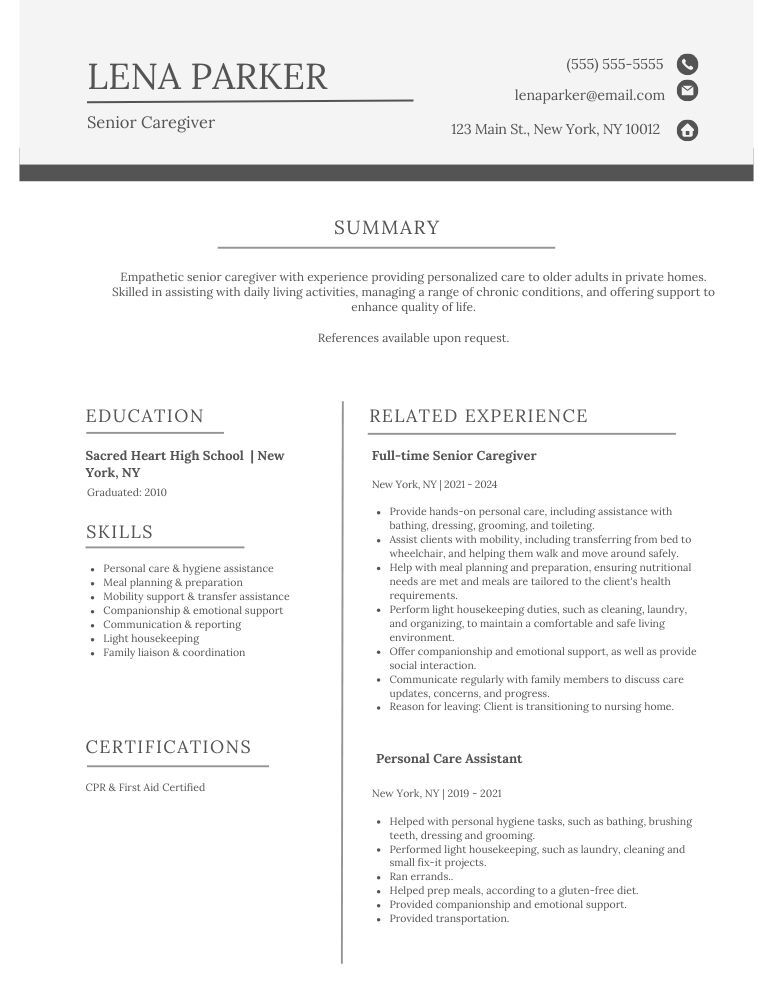When you’re looking for a job as an adult or senior caregiver or home health aide, having a resume that highlights your strengths and your certifications can set you apart from the competition. The formal record of your experience should include your skills, your relevant certifications and any training that you may have had. After all, when all of your details are clearly laid out on your resume, it’s easier for someone who’s hiring to see that you’re an ideal choice for the job that they’ve posted.
“You always want your resume to align with the job duties and job description,” says Lorraine Rise, a certified professional resume writer and career coach based in the Washington, D.C. area, who is a member of the Professional Association of Resume Writers and Career Coaches. “Your resume should showcase how successfully you’ve done the duties included in a job listing’s description.”
Here, top tips for writing a standout caregiver resume to land a rewarding position.
Caregiver resume sample
Below, find a caregiver resume example, based on someone with moderate experience as a senior caregiver.

(Click to download this caregiver resume template as a PDF.)
What to include on your caregiver resume
No two caregiver resumes are alike, but the following general information should be on your CV.
1. Contact information
List your name and contact information at the top of your resume.
Directly beneath your personal information, include a Professional Summary, which is a special section that highlights your qualifications as a caregiver. This section is essential because people who review resumes often only glance at each one for a few seconds to decide whether or not a candidate will be a good fit for the position. You’ll be more likely to land a job interview with a strong professional caregiver summary at the top.
This should be a two-sentence paragraph that summarizes the most important points you want to communicate to a hiring manager, says Sharon Stern, a certified career coach based in the New York metropolitan area. “Say something like: ‘Energetic licensed nurse with experience working with the elderly,’ and anything else they feel is really important,” she notes.
And if you have any special skills — say, you’re fluent in Spanish or French, or you have CPR certification — be sure to include it here as well.
2. Skills and experience
Within your Experience section, list the skills that are unique to being a senior caregiver or home health aide, so that hiring families or managers will know that you have the background to do the job well.
Mention what you’ve done in each position that you’ve held, and give examples. Say that you help elderly or frail people to go about their daily functions, drive them to doctor appointments as needed, help them take medication, prepare meals for them, act as a companion, help them exercise, assist them with bathing/grooming and that you communicate concerns about their health to the supervisor.
“For home health aides, reliability, professionalism and sense of customer service are also critical to emphasize,” Rise says. “It’s a good idea to add a few soft skills — time management, organization — to the resume, but don’t over-rely on them.”
If you’re drawing a blank on what skills you should include in your caregiver resume, an easy way to jog your memory is by seeing what other caregiver candidates are including on theirs. You can do this a few ways:
- Talk to any friends who are caregivers and ask them what they’ve included on their resumes.
- Check out senior caregiver profiles on Care.com.
- Read through senior caregiver job postings on sites like Care.com and Indeed.com and see what skills employers are looking for.
3. Relevant personal experience
A caregiver resume is an excellent place to list any senior care experience that you may have had, even if you gained that experience by caring for an ailing relative.
“They should just write down exactly what they did — all those things like getting to appointments at the right time, being able to transport them, caring for their bodily needs and their showers,” Stern says. “They don’t need to mention that it was their father or their uncle.”
It’s perfectly reasonable to list the family caregiving experience within the Experience section of your resume, even if you weren’t paid to care for a relative. “If it’s something that you did for an extended period of time, list it in a similar manner to your jobs,” Rise says. “If you took time off of work to do the caregiving, then you should definitely list it as a job.”
“Certifications also add credibility and competitiveness and demonstrate a commitment to the profession.”
—Lorraine Rise, career coach
4. Certifications
Are you certified in CPR and first-aid training? Do you have a current driver’s license? Are you a certified nursing assistant (CNA)? Include all of these details in a Certifications section of your resume.
“For most other industries, these items would not be necessary, but for a home health/caregiver position, these are very relevant items,” says Rise. “Certifications also add credibility and competitiveness and demonstrate a commitment to the profession.”
5. Final details
Many employers want their senior caregivers to be high school graduates. If you’ve graduated, list this detail in an Education section within your resume.
“For home health aides, a high school diploma is typically necessary,” says Rise. “If you don’t have one, you can skip the Education section.”
If you’ve only been a caregiver for a few years, it’s OK to list jobs in other fields within your Experience section to show that you’ve been steadily employed for the past 15 years or so. “People want to see what you did for all of those years,” says Stern. “As long as you worked, it’s good.”
The bottom-line: Ensuring that you’re presenting a polished resume will help show off your professionalism during your job search — and help you land a fitting, rewarding position.
Originally written by Lisa Fields.





